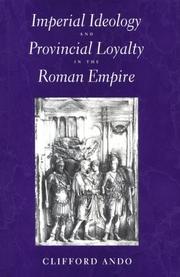| Listing 1 - 2 of 2 |
Sort by
|

ISBN: 0520923723 1597346721 9780520923720 0585394598 9780585394596 0520220676 9780520220676 9781597346726 Year: 2000 Publisher: Berkeley University of California Press
Abstract | Keywords | Export | Availability | Bookmark
 Loading...
Loading...Choose an application
- Reference Manager
- EndNote
- RefWorks (Direct export to RefWorks)
The Roman empire remains unique. Although Rome claimed to rule the world, it did not. Rather, its uniqueness stems from the culture it created and the loyalty it inspired across an area that stretched from the Tyne to the Euphrates. Moreover, the empire created this culture with a bureaucracy smaller than that of a typical late-twentieth-century research university. In approaching this problem, Clifford Ando does not ask the ever-fashionable question, Why did the Roman empire fall? Rather, he asks, Why did the empire last so long? Imperial Ideology and Provincial Loyalty in the Roman Empire argues that the longevity of the empire rested not on Roman military power but on a gradually realized consensus that Roman rule was justified. This consensus was itself the product of a complex conversation between the central government and its far-flung peripheries. Ando investigates the mechanisms that sustained this conversation, explores its contribution to the legitimation of Roman power, and reveals as its product the provincial absorption of the forms and content of Roman political and legal discourse. Throughout, his sophisticated and subtle reading is informed by current thinking on social formation by theorists such as Max Weber, Jürgen Habermas, and Pierre Bourdieu.
Allegiance --- Political stability --- Roman provinces --- State governments --- Destabilization (Political science) --- Political instability --- Stability, Political --- Consensus (Social sciences) --- Legitimacy of governments --- Loyalty, Political --- Political loyalty --- Loyalty --- Citizenship --- Patriotism --- Administration. --- Rome --- Rim --- Roman Empire --- Roman Republic (510-30 B.C.) --- Romi (Empire) --- Byzantine Empire --- Rome (Italy) --- History --- Influence. --- Cultural policy --- Allegiance - Rome. --- Political stability - Rome. --- administration. --- allegiance. --- ancient rome. --- ancient world. --- augustus. --- body politic. --- bourdieu. --- bureaucracy. --- central government. --- christian ideology. --- empire. --- fall of the empire. --- government. --- habermas. --- history. --- imperial identity. --- max weber. --- nonfiction. --- political consensus. --- political stability. --- politics. --- power struggle. --- power. --- provinces. --- provincial loyalty. --- revolt. --- roman emperors. --- roman empire. --- roman government. --- roman history. --- roman military. --- roman senate. --- rome. --- social formation.

ISBN: 0520220676 9780520220676 0520280164 0520923723 1597346721 Year: 2000 Volume: 6 Publisher: Berkeley (Calif.): University of California press,
Abstract | Keywords | Export | Availability | Bookmark
 Loading...
Loading...Choose an application
- Reference Manager
- EndNote
- RefWorks (Direct export to RefWorks)
The Roman empire remains unique. Although Rome claimed to rule the world, it did not. Rather, its uniqueness stems from the culture it created and the loyalty it inspired across an area that stretched from the Tyne to the Euphrates. Moreover, the empire created this culture with a bureaucracy smaller than that of a typical late-twentieth-century research university. In approaching this problem, Clifford Ando does not ask the ever-fashionable question, Why did the Roman empire fall? Rather, he asks, Why did the empire last so long? Imperial Ideology and Provincial Loyalty in the Roman Empire argues that the longevity of the empire rested not on Roman military power but on a gradually realized consensus that Roman rule was justified. This consensus was itself the product of a complex conversation between the central government and its far-flung peripheries. Ando investigates the mechanisms that sustained this conversation, explores its contribution to the legitimation of Roman power, and reveals as its product the provincial absorption of the forms and content of Roman political and legal discourse. Throughout, his sophisticated and subtle reading is informed by current thinking on social formation by theorists such as Max Weber, Jürgen Habermas, and Pierre Bourdieu.
Allegiance --- -Political stability --- -Destabilization (Political science) --- Political instability --- Stability, Political --- Loyalty, Political --- Political loyalty --- Rome --- Cultural policy --- -Influence. --- History --- Provinces --- -Administration. --- Political stability --- Roman provinces --- Administration. --- Influence. --- Allégeance --- Stabilité politique --- Politics and government --- Administration --- Politique et gouvernement --- Histoire --- State governments --- Destabilization (Political science) --- Consensus (Social sciences) --- Legitimacy of governments --- Loyalty --- Citizenship --- Patriotism --- Rim --- Roman Empire --- Roman Republic (510-30 B.C.) --- Romi (Empire) --- Byzantine Empire --- Rome (Italy) --- Allegiance - Rome. --- Political stability - Rome. --- Influence --- administration. --- allegiance. --- ancient rome. --- ancient world. --- augustus. --- body politic. --- bourdieu. --- bureaucracy. --- central government. --- christian ideology. --- empire. --- fall of the empire. --- government. --- habermas. --- history. --- imperial identity. --- max weber. --- nonfiction. --- political consensus. --- political stability. --- politics. --- power struggle. --- power. --- provinces. --- provincial loyalty. --- revolt. --- roman emperors. --- roman empire. --- roman government. --- roman history. --- roman military. --- roman senate. --- rome. --- social formation.
| Listing 1 - 2 of 2 |
Sort by
|

 Search
Search Feedback
Feedback About UniCat
About UniCat  Help
Help News
News